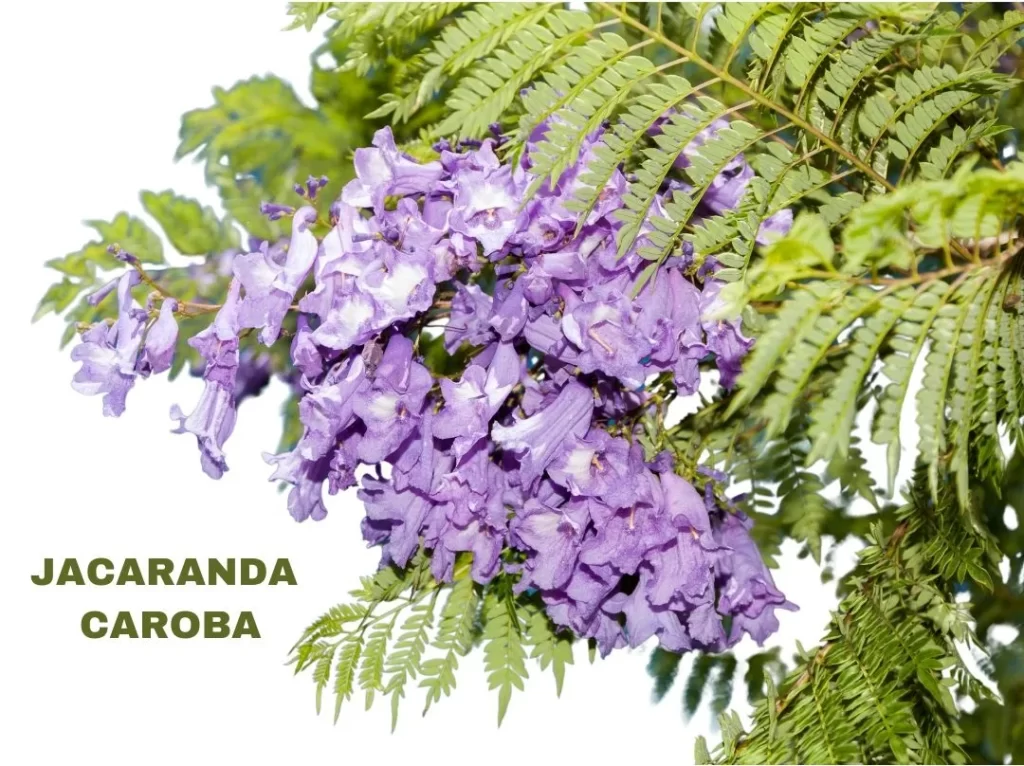Jacaranda Caroba, commonly known as the Brazilian Caroba-tree, is traditionally reputed for its effectiveness in treating venereal diseases and rheumatism.
It is also noted for its urinary and sexual symptom alleviation and morning sickness relief.

Table of Contents
ToggleSOURCE INFORMATION
Scientific Classification
- Family: Bignoniaceae
- Genus: Jacaranda
- Species: J. caroba
Origin
- Jacaranda Caroba is native to Brazil and other parts of South America.
- It has been used in traditional medicine by indigenous peoples for various ailments.
Historical Facts
- Traditional Use: Indigenous tribes in South America have utilized the leaves and bark of Jacaranda Caroba to treat syphilis, gonorrhoea, and rheumatic conditions.
- Medical Use: Introduced into Western medicine during the 19th century, it gained popularity for its specific action on venereal and rheumatic diseases.
DRUG PATHOGENESIS
Jacaranda Caroba acts primarily on the urinary and sexual systems, alleviating inflammation and discharge.
It also has significant effects on the musculoskeletal system, particularly in rheumatic and gonorrhoeal arthritis.
KEY CHARACTERISTICS
- Urinary Symptoms: Inflammation of the urethra with yellow discharge.
- Sexual Symptoms: Pain and heat in the penis, painful erections, and phimosis.
- Rheumatic Symptoms: Pain in joints, particularly the right knee, and morning stiffness of muscles.
- Venereal Diseases: Effective in treating symptoms of gonorrhoea and syphilis.
DETAILED ORGAN SYMPTOMS
HEAD
- Vertigo: Dizziness upon rising, accompanied by a heavy forehead.
- Eye Pain: Inflammation and watering of the eyes.
- Coryza: Nasal congestion with a heavy head feeling.
THROAT
- Sore Throat: Dryness and a constricted feeling in the throat.
- Vesicles: Small fluid-filled sacs in the pharynx.
URINARY
- Urethritis: Inflammation of the urethra with discharge of yellow matter.
MALE SEXUAL SYMPTOMS
- Penile Pain: Heat and pain in the penis, painful erections.
- Phimosis: Tight and painful foreskin.
- Preputial Swelling: Swelling and pain of the prepuce (foreskin).
- Chancroid: Painful ulcers on the genitalia.
- Chordee: Painful curvature of the penis during erection.
- Itching Pimples: Presence of itchy pimples on the glans and prepuce.
EXTREMITIES
- Rheumatic Pain: Pain in the right knee, often related to gonorrhoea.
- Lumbar Weakness: Weakness in the lower back region.
- Morning Soreness: Soreness and stiffness of muscles, particularly in the morning.
- Gonorrhoeal Rheumatism: Rheumatic symptoms associated with gonorrhoea.
- Itching Pimples: Presence of itchy pimples on the hands.
- Syphilitic Arthritis: Arthritis symptoms associated with syphilis.
RELATIONSHIP WITH OTHER DRUGS
Compare:
- Thuja: Known for its effectiveness in treating warts and other growths, as well as urinary and venereal symptoms.
- Corallium Rubrum: Used for syphilitic conditions, especially with mucous membrane involvement.
- Jacaranda Gualandai: Specifically indicated for syphilitic symptoms affecting the eyes and throat, and for atonic ulcers and dark, painless diarrhea.
DOSE
Homeopathic Uses
- Tincture to Third Potency: The recommended dilution for treating symptoms associated with venereal diseases and rheumatism.
Frequently Asked Questions
What conditions can Jacaranda Caroba treat?
- Jacaranda Caroba is used primarily for treating venereal diseases like gonorrhoea and syphilis, rheumatic conditions, and specific urinary and sexual symptoms.
How is Jacaranda Caroba administered?
- It is typically administered in tincture form or diluted to the third potency in homeopathic practice.
Are there any side effects of Jacaranda Caroba?
- While side effects are generally rare when used in homeopathic doses, some individuals may experience mild digestive disturbances or allergic reactions.
Meaning of Difficult Words
- Venereal Diseases: Diseases that are transmitted through sexual contact, such as gonorrhoea and syphilis.
- Phimosis: A condition where the foreskin of the penis is too tight to be pulled back over the glans (head of the penis).
- Chancroid: A bacterial infection characterized by painful ulcers on the genital area.
- Chordee: A condition where the penis curves abnormally, often causing pain during an erection.
- Coryza: Inflammation of the mucous membrane in the nose, resulting in nasal congestion and discharge.
- Urethritis: Inflammation of the urethra, typically causing pain and discharge.
- Pathogenesis: The development and progression of a disease or condition.
- Urea: A waste product formed in the liver and excreted in the urine. It is a primary end product of protein metabolism.
- Diaphoresis: Excessive sweating, often to an abnormal degree.
- Atrophic Choroiditis: A condition characterized by the thinning and degeneration of the choroid, a layer of the eye.
- Ptyalism: Excessive production of saliva.
- Dicrotic Pulse: A type of pulse with a double beat, often felt in conditions of certain heart diseases.
- Cyanosis: A bluish discoloration of the skin and mucous membranes caused by insufficient oxygen in the blood.
- Pulmonary Oedema: Accumulation of fluid in the lungs, leading to difficulty in breathing.
- Uraemia: A condition involving elevated levels of waste products in the blood, typically due to kidney dysfunction.
- Atonic Ulcers: Ulcers that are characterized by a lack of normal muscle tone or strength, leading to poor healing.
